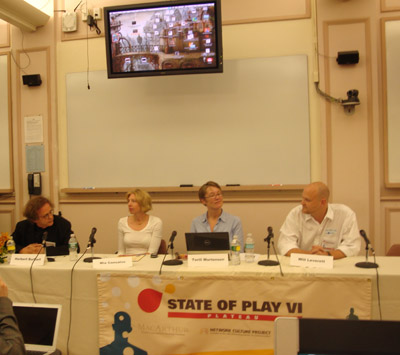
This was a delightful session. The speakers were all great. Here are my notes on the session:
Herbert Burket [German law professor]
Three devices in games that maintain the interest in winning and create a taboo in losing: diversion, avoidance and reinterpretation.
- Diversion: a game gives you an indication of losing and lets you try again.
- Avoidance: bringing forward advertising games where you cannot lose at all.
- Reinterpretation: to reinterpret losing as winning.
There is room for thinking about the losing experience in the gaming world. Rather than giving players the experience of losing but losing is an opportunity to take them out of the game and have a more reflective view of the losing experience. There are three strategies that help deepen the experience of losing:
- The tragedy games: when a player has an unsurmountable barrier.
- Winning is losing: eg players upload their friends pics and think they are on their team but end up shooting them.
- Dependence games: other players constantly redefine what is success and leaves each individual players chasing other goals that other individuals are setting.
Not to dwell on the experience of losing in a game is itself a loss.
Mia Consalvo [MIT]
Western Otaku: games crossing
Globalization. VW as transnational spaces. People play SL and final fantasy play on shared servers. You can play it on any platform so it is also cross platform. Otaku are fans of Japanese who like Japanese culture. Gives them space to encounter ‘the other’. Impact on culture?
Spectrum of interests: interest in stories/gameplay; might lead to further interests such as learning language; creates possibilities to be exposed to different people, your beliefs challenged etc.
Torill Mortensen [Norway]
Physical playspace: how do people integrate machines into their lives – especially gamers? Game objects come out of the game – eg. Dragons come out in art and drawing.
Results:
- The use of game technology is adjusted to the needs of the players, illustrating social structures as much as game structures.
- Often behaviours overlap mong fields, highlighting cultural synchronicity.
- If we define vw the way bart simon did as ways of living which are artificially constructed and depend on tech, independent of georgraphy, then the ‘rane’ world
- The time spent in digital spaces is as real a the time spent in cars.
- The vw is already in the world.
Will Leverett
What happens when we give people the most sophisticated tools today? Realtimeworlds [will be out in Feb]. Detailed views of avatars – muscles, tattoos, skin color, facial expressions. It also has its own music creator.